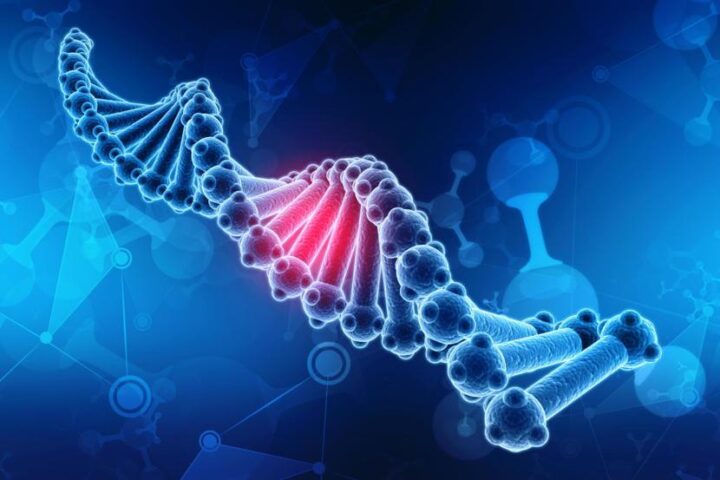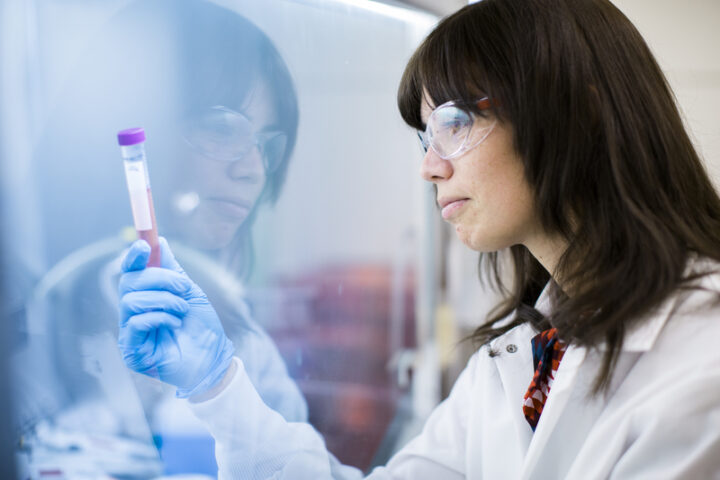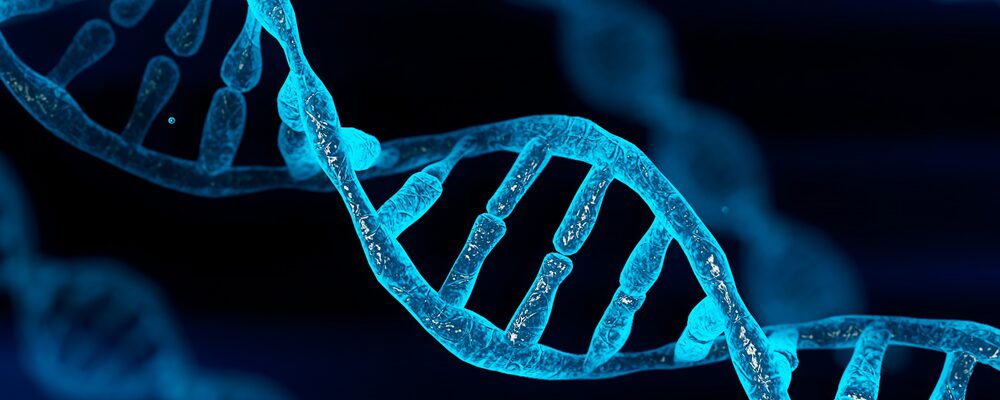DNA (Deoxyribonucleic Acid) is a molecule that carries the genetic instructions used in the growth, development, functioning, and reproduction of all living organisms. It is a double-stranded helix structure made up of nucleotides, which are the basic building blocks of DNA.
The nucleotides in DNA contain a phosphate group, a sugar molecule (deoxyribose), and one of four nitrogenous bases: adenine (A), thymine (T), guanine (G), or cytosine (C). The sequence of these bases along the DNA molecule determines the genetic code and controls the production of proteins, which are essential for the structure, function, and regulation of cells and tissues. According to Healthline, an individual’s complete DNA set is called the genome.
DNA replicates itself during cell division, ensuring each new cell receives a complete set of genetic information. It can also undergo mutations, which change the genetic code and alter the traits of an organism. DNA is a fundamental molecule that plays a crucial role in the inheritance and evolution of life on Earth.
The Function of DNA

The primary function of DNA is storing and transmitting genetic information across generations. The genetic information is encoded in the sequence of nucleotides, unique to each individual. The nucleotide sequence determines the structure and function of all the proteins that the cell produces. Proteins are the building blocks of the cell, and they perform many vital bodily functions, such as enzymes that catalyze chemical reactions, hormones that regulate bodily functions and structural proteins that provide cell support.
According to MyBioSource, DNA also plays a critical role in DNA replication, where the DNA is copied to produce new cells during cell division. DNA also provides the basis for the inheritance of genetic traits from parents to offspring, and it is responsible for the diversity of life on Earth.
DNA and Health, Disease, Aging
DNA is involved in many aspects of human health. Scientists have identified more than 3,000 genetic diseases caused by mutations in the sequence of nucleotides in DNA. Genetic mutations can lead to disorders such as cystic fibrosis and Huntington’s disease. Understanding how these mutations affect the structure and function of proteins can help us develop treatments or cures for these diseases.
DNA is also involved in the aging process. As we age, our cells accumulate damage to their DNA, which can lead to a decline in physical and mental function. Scientists are studying how this DNA damage contributes to the aging process and exploring ways to limit its effects on health.
DNA is a molecule that plays an essential role in health, disease, and aging. It stores and transmits genetic information across generations and undergoes mutations that can lead to both beneficial and harmful traits. By understanding the structure and function of DNA, we can better understand how it affects our health and develop treatments for genetic diseases.
The Role of DNA in Health, Disease, and Aging

DNA plays a critical role in health, disease, and aging in several ways:
Health: DNA determines an individual’s genetic makeup, including physical characteristics, susceptibility to certain diseases, and even personality traits. Understanding an individual’s DNA can provide valuable insights into potential health risks and help healthcare professionals develop personalized prevention and treatment plans.
Disease: Mutations or changes in DNA can cause genetic diseases, which can range from mild to severe. Examples of genetic diseases include sickle cell anemia, cystic fibrosis, and Huntington’s disease. In addition, mutations in DNA cause certain cancers that lead to uncontrolled cell growth and division.
Aging: As we age, our DNA changes, such as the shortening of telomeres (the protective caps on the ends of chromosomes). These changes can lead to a decline in the function of cells and tissues, making us more susceptible to age-related diseases such as Alzheimer’s, arthritis, and cardiovascular disease.
How DNA works?
How DNA works is an incredibly complex topic but understanding the basics can help us gain insight into why certain diseases occur and how we might be able to treat or even prevent them. By studying DNA, scientists are constantly making new discoveries that may lead to powerful tools for preventing and treating illnesses. We should take advantage of this knowledge and stay abreast of the most up-to-date research on how DNA works and what it can tell us about our health.
At its most basic, DNA is made up of a series of chemical building blocks, called nucleotides. These nucleotides are arranged in specific sequences to form the double helix structure that we recognize as DNA. This sequence dictates the information stored in the DNA and is responsible for everything from eye color to susceptibility to certain diseases.
Each gene contains a specific sequence of nucleotides that codes for a particular protein or set of proteins. When a gene is activated, it triggers the production of these proteins, which perform essential functions within cells and tissues. Mutations in genes can cause changes in protein structure and function, which can lead to various diseases.
By understanding how DNA works and its role in human health and disease, scientists are now able to use this knowledge to develop treatments and new medicines for genetic disorders. This is just one of the many exciting ways that DNA research has opened up new possibilities for improving our lives.
Conclusion

DNA determines an individual’s genetic makeup and regulates its growth, development, functioning, and reproduction. It also plays a crucial role in determining an individual’s health, susceptibility to disease, and rate of aging. Understanding DNA and how it changes over time can help us develop better treatments and preventative measures for many health conditions. As we continue to make progress in the field of genetics, new discoveries are being made all the time, giving us a greater understanding of how DNA works and what it can tell us about our health. With this knowledge, we can develop more effective ways of preventing and treating genetic diseases and other conditions related to DNA.




